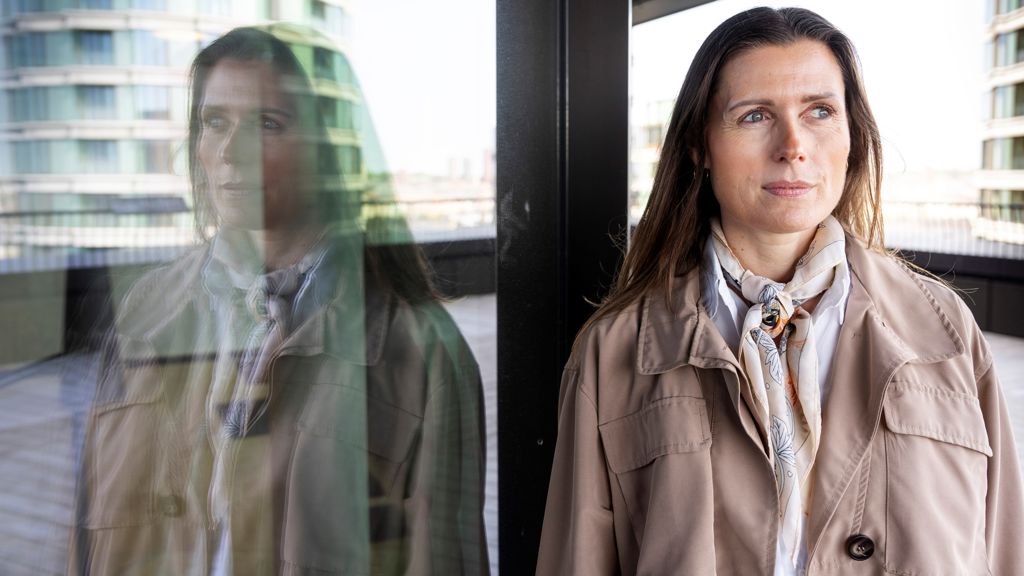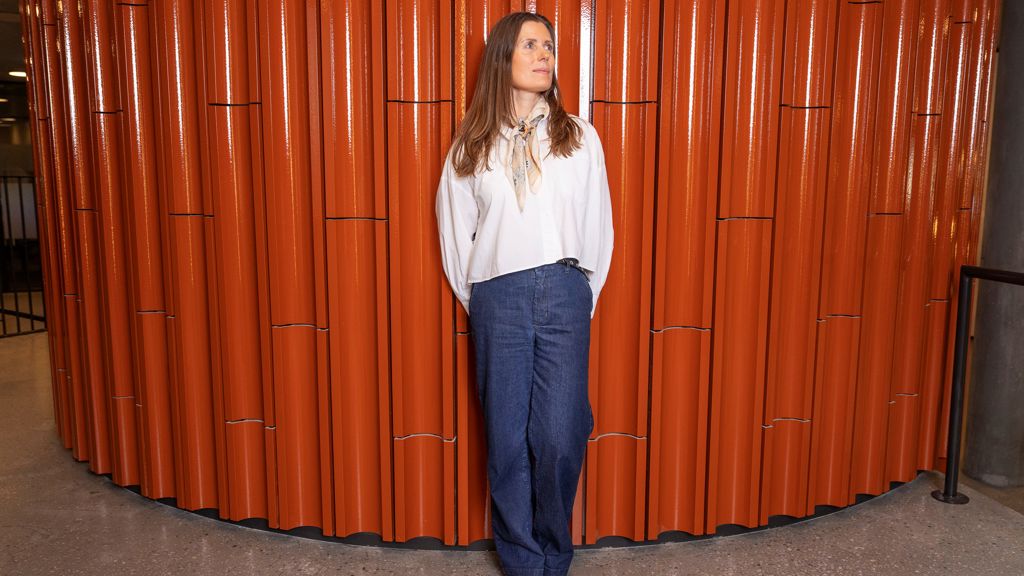Mette was on her own with severe symptoms of menopause: Now she wants to help others
Mette Onsvig Buhl didn't recognise herself at all when she went into menopause quite unprepared and suddenly. A networking group at work has not only given her knowledge and support, it has also been decisive for her ability to stay in her job.

She hadn't shared her symptoms with anyone until a friend by coincidence mentioned “hormone supplements” which had helped her.
“I'm from a generation that doesn't talk about menopause, or at least, in my circle of friends and at home, we didn't. So I simply didn't know enough and couldn't explain in words what I was experiencing," says Mette Onsvig Buhl.
She went to the doctor and was prescribed hormone patches, and after a few weeks, she was back to being a fairly familiar version of herself again.
“The treatment has given me some peace of mind. It doesn't eliminate all my symptoms. But it allows me to function as a person, both privately and professionally, and if I hadn't been given that medication, I would have had to call in sick," she notes.
May resemble stress
Another important reason why Mette Onsvig Buhl's has had no sick days on account of her severe menopause symptoms is a network that was established at her workplace two years ago.
Danske Stress Network is rooted in the bank's DE&I team and was created by Frederikke Krogh-Meibom after she herself went through a long period of stress.
Today, the network has several subgroups, including one for parents returning from maternity/paternity leave, first-time employees and, in the past year, a group focusing on menopause.
“We come to work as whole people with every thought and emotion. "That's why menopause is an important phase of life to focus on, because it is both a taboo and a difficult condition to describe," explains Frederikke Krogh-Meibom, who facilitates the network meetings herself and currently works full-time with Danske Stress Network.
New members join the menopause group via word of mouth, and it spreads like wildfire when people overhear fragments of conversations about this phase of life.
“If we don't address what's really going on, menopause symptoms may very easily be confused with stress symptoms. Being allowed to say something out loud that you don't find easy to share elsewhere is in itself a stress reliever. So in addition to zooming in on all the symptoms and understanding them, the preventive effort is also about breaking with loneliness and shame about sharing how you feel in your organisation,” says Frederikke Krogh-Meibom.
She underlines that Danske Stress Network is generally a continuation of the support provided to employees who activate their health insurance and that provided by their managers.
“They experience that the organisation can do more and do something different when colleagues come together in completely different types of conversations,” she says.
Mette Onsvig Buhl sees the network group as a “place where you can get your thoughts off your chest and be understood”.
“In the past, I regularly shared my experiences of being in menopause with close colleagues – even when I wasn't fully aware of what was happening. But the group has more or less saved me from collapsing with some kind of stress,” she says.
The menopause group at Danske Bank meets approximately every six weeks. On occasion, a speaker is invited, but otherwise there is rarely an agenda.
The conversation is shaped by the women's need to share their experiences with various aspects of menopause – from trea
“We try to let the talk centre on some themes, but we prefer it to be a confidential forum where we can speak freely from the heart. It's moving to hear the younger women dealing with matters that I myself haven't experienced at an early age. Even if you can't take the problems away from them, you can at least listen and support them so they don't go through it alone," says Mette Onsvig Buhl.
Menopause ambassador
Together with a few others from the network group of Danske Stress Network, Mette Onsvig Buhl is working to teach more people in the organisation about menopause.
“Some of us are truly committed to making menopause less of a taboo in the workplace. We don't want to be presented as being sick – we want to explain or share! For example, I would like to be a kind of menopause ambassador, whom you meet in the hallway wearing a special coloured key hanger on the access card, signalling that I am able to talk about menopause and the network," she says.
Menopause ambassadors are found in many large workplaces in England, where society is much more advanced in terms of not only talking about menopause at the workplace, but also distributing information and launching initiatives in support of employees in this phase of life.
It is estimated that around 25 per cent of all workplaces in the UK have a menopause policy or action plan.
That direction is the goal for Mette Onsvig Buhl, and in the network they have talked about many different initiatives.
“For example, we would like to have a fan and a QR code in all meeting rooms directing employees or managers to the intranet page on symptoms and challenges of some of their colleagues during menopause. But we would also like to have Management's support for our initiative to distribute information on the topic to the entire bank – this could, for example, also be part of the onboarding process for new employees and managers,” she suggests.

”Brain fog”
Mette Onsvig Buhl experiences a general lack of knowledge about menopause – especially about the lesser-known symptoms, which are often broadly called “brain fog”. It could, for example, be feelings of stress, anxiety, difficulty concentrating or the feeling of having a duvet over your head.
These types of symptoms have bothered Mette the most in her working life.
“You may all of a sudden become anxious about the most basic things. It may also appear in relation to work. And what can you do in that situation? I have to deal with it myself, but how cool would it be if you could also get help from guidelines or the like that were available on, for example, the intranet. It's anxiety-provoking to have to explain what's at stake. And I'm not sure how to put it.
Again, Danske Stress Network plays a role, because "sharing is caring" in the words of Mette Onsvig Buhl.
“I have colleagues and friends who have not even realised that it is actually menopause that is causing them to have brain fog, sleep poorly or be unfocused. At the same time, you feel a bit sad about what you are going through. And this you can actually share with the group.”
Mette Onsvig Buhl herself says that she has developed a “popcorn brain'” She may suddenly forget what she is doing, and then it pops up later. And it is often difficult to find the energy and motivation to live a normal life.
“My honest opinion is that it is super exciting to learn new tools or IT systems, but it becomes a challenge for me as an employee with a mental deficit. How am I supposed to be able to learn something new when I'm trying my best to hang on for eight hours a day at work?" she says, addressing the fact that workplace managers must take menopause seriously.
“We are a relatively large group of employees dealing with something we haven't really been able to articulate before. We don't want to leave the labour market, we feel resourceful and are at an age where many of us have grown children, and so we should have the energy to work, right? Therefore it's super important that our workplace accommodates our need for dealing with the challenges we have," says Mette Onsvig Buhl.
Danske Bank network
Danske Stress Network is anchored in Danske Bank's DE&I team in Group HR and was created two years ago by Frederikke Krogh-Meibom, who currently works full-time with the network.
Today, the network contains both a stress reduction track and a preventive track. The stress reduction track has groups for those of the bank colleagues who have symptoms of stress, are absent owing to stress or are recovering from stress.
The preventive track has groups for the young parents of the bank who are returning after maternity/paternity leave, for young first-time employees, a grief group, a group for international colleagues and, in the past year, also a group focusing on menopause.
In the autumn of 2024, Finansforbundet also established a menopause network across the sector, which quickly filled up and is now closed for intake. The members run the network meetings themselves.
The purpose of the network is "to break down the taboo and myths about menopause and in turn create a confidential platform for knowledge sharing and a sense of community, which may contribute to improved well-being, increased production and a more inclusive work culture to the benefit of both employees and the organisation."





